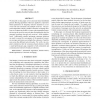Free Online Productivity Tools
i2Speak
i2Symbol
i2OCR
iTex2Img
iWeb2Print
iWeb2Shot
i2Type
iPdf2Split
iPdf2Merge
i2Bopomofo
i2Arabic
i2Style
i2Image
i2PDF
iLatex2Rtf
Sci2ools
110
Voted
ICASSP
2011
IEEE
2011
IEEE
Consensus-based distributed particle filtering algorithms for cooperative blind equalization in receiver networks
We describe in this paper novel consensus-based distributed particle filtering algorithms which are applied to cooperative blind equalization of frequency-selective channels in a network with one transmitter and multiple receivers. The proposed algorithms employ parallel consensus averaging iterations to evaluate the product of some node-dependent quantities across the receiver network, thus eliminating the need for message broadcasts beyond each receiver’s local neighborhood. Additionally, parallel minimum consensus iterations are used to assess the convergence of the quantized consensus averages and ensure accordingly the coherence of particle sets across the different network nodes. We verify via computer simulations that the consensus-based schemes exhibit a small performance gap compared to both centralized and communication-intensive broadcast solutions.
Consensus-based Distributed Particle | ICASSP 2011 | Minimum Consensus Iterations | Quantized Consensus Averages | Signal Processing |
| Added | 21 Aug 2011 |
| Updated | 21 Aug 2011 |
| Type | Journal |
| Year | 2011 |
| Where | ICASSP |
| Authors | Claudio J. Bordin, Marcelo G. S. Bruno |
Comments (0)

